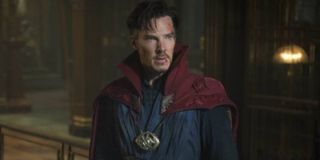How Marvel Is Looking At Origin Stories Going Forward, According To Kevin Feige

You may not have noticed it, but Marvel Studios pulled off something interesting in the last two years. While their bread-and-butter used to be origin stories -- directly adapting classic comics in establishing individual heroes to be a part of the larger universe -- that wasn't on the agenda for any project released in either 2017 or 2018. It makes one wonder how the studio's philosophy regarding these narratives may have changed, and to hear it from Marvel Studios President Kevin Feige, the situation is... complicated. He recently told me,
I don't think there's any overarching philosophy. I think it's case by case. Had [Black] Panther not appeared in [Captain America:] Civil War would we have done a different version of the opening of that movie? Maybe. It is, sometimes, like Doctor Strange, origins can be great, origin stories can be fascinating. If there are, in the future, new stories that require origins... When I talk about a traditional origin structure, it's Superman: The Movie, right? It's following that - or even Iron Man. Taking an hour-plus to see the guy or the girl in the outfit. Sometimes that's the way to do it. Sometimes that's great. And sometimes there are other ways to do it.
I found myself contemplating origin stories recently while thinking about Ant-Man & The Wasp, specifically it's ability to tell a natural and fitting story for its heroes without being anchored to exposition and introductions. As you may have guessed, I then brought these thoughts with me to my interview with Kevin Feige over the weekend, during the new Marvel movie's Los Angeles press day. Given that we haven't seen a classic origin story since 2016, I asked if the company's mindset has evolved, but in Feige's response I learned that the answer isn't super cut and dry.
Essentially there is no black and white answer about Marvel Studios' current approach to origin stories, the idea essentially coming down to a "case-by-case basis," but it does notably create a surprising conflict for them that will become exponentially harder to deal with creatively as the Marvel Cinematic Universe continues to and expand with new characters. There has always been a very clear dedication to the source material exercised by this franchise, but the sameness of some of the classic stories might wind up being creative quicksand for these movies, should they not be able to mix things up and take different approaches to narratives.
The good news is that this is something that Kevin Feige recognizes, which means that Marvel on the whole will be able to address it in the coming years. While there may not be a specific philosophy regarding whether or not to do origin stories, there is one about constantly trying to do new things, experimenting with different genres, and crafting unique arcs.
I think it's much less specific to any notion of 'origin,' because, as I just said, sometimes it can be subverted, sometimes you just play it out. That's the better way to do it. The bigger philosophy is, with each film we make, how can we do it in a way we haven't done before? How, whether that's a sequel, whether that's an origin, whether that's a spin off, how can we do a movie that entertains ourselves first, as we develop it and as we produce it, because hopefully that happens than when it's on the screen, it'll entertain the audience as well.
Kevin Feige then proudly put Marvel Studios' track record out on the table, noting that it's changing things up and doings things differently that has gotten them this far:
Ant-Man & The Wasp is our 20th film in the MCU, and I think we've gotten here by surprising people, surprising ourselves, and changing things where things need to be changed, and altering things and adapting things, and keeping it, for lack of a better term, fresh. And that will continue.
Of course, there is a big project on the horizon that should be an interesting addition to this on-going conversation. I am, of course, referencing Anna Boden and Ryan Fleck's Captain Marvel. The 90s-set sci-fi movie will be the first Marvel Cinematic Universe title since 2016 to introduce a hero we've never seen on screen before, and there will be a lot of eyes watching to see how the franchise handles the heroic origins/transformation of Carol Danvers, played by Brie Larson. That picture should be a lot clearer in a few months when the first trailer is released.
Between now and then, fans will be able to enjoy the on-going adventures of Ant-Man (Paul Rudd) and The Wasp (Evangeline Lilly), with their new movie hitting theaters on July 6th. Stay tuned here on CinemaBlend with more from my interviews with the stars and director of the film, as well as more from my sit down with Kevin Feige.
CINEMABLEND NEWSLETTER
Your Daily Blend of Entertainment News

Eric Eisenberg is the Assistant Managing Editor at CinemaBlend. After graduating Boston University and earning a bachelor’s degree in journalism, he took a part-time job as a staff writer for CinemaBlend, and after six months was offered the opportunity to move to Los Angeles and take on a newly created West Coast Editor position. Over a decade later, he's continuing to advance his interests and expertise. In addition to conducting filmmaker interviews and contributing to the news and feature content of the site, Eric also oversees the Movie Reviews section, writes the the weekend box office report (published Sundays), and is the site's resident Stephen King expert. He has two King-related columns.
Most Popular




